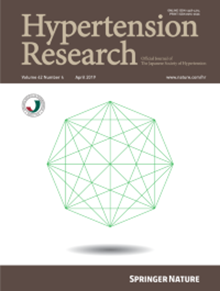肝细胞癌lenvatinib治疗后血压升高:更好预后的潜在标志。
IF 4.3
2区 医学
Q1 PERIPHERAL VASCULAR DISEASE
引用次数: 0
摘要
Lenvatinib是一种酪氨酸激酶抑制剂,可有效抑制血管内皮生长因子信号传导,用于治疗肝细胞癌。然而,血管生成抑制剂经常引起高血压。虽然lenvatinib诱导的高血压已被认为是预后更好的潜在替代标志物,但关于lenvatinib启动后血压升高和结局的研究有限。该研究包括2018年5月至2023年12月期间在鹿儿岛大学医院消化内科接受lenvatinib治疗的67例患者。队列的中位年龄为71岁,82.1%的患者为男性。入院时血压中位数为128/73 mmHg,给予lenvatinib后1天显著升高至136/76 mmHg。37.3%的患者住院期间发生3级高血压(≥160/100 mmHg)。入院至住院期间收缩压峰值的中位升高为26 mmHg。血压升高≥26 mmHg的患者被归为血压升高组,即使在调整了年龄、性别、疾病分期、运动状态和肝脏储备功能后,其死亡率也明显低于血压未升高组(35.3% vs. 81.8%, log-rank p = 0.007)。该研究表明,服用lenvatinib后早期血压升高的患者总体死亡率较低。这些发现表明,lenvatinib启动后的血压升高可能是接受lenvatinib治疗的癌症患者有价值的预后指标。Lenvatinib给药后早期血压升高从Lenvatinib给药后的第一天开始观察到明显的血压升高,中位收缩压升高26 mmHg。38%的患者住院期间出现3级高血压(≥160/100 mmHg)。39%的患者在住院期间加强了降压治疗,但12%的患者在出院前一天仍有3级高血压。•血压升高与预后的关系即使在调整了年龄、性别、疾病分期、运动状态和肝功能储备后,血压升高仍被认为是一个更好的预后因素。本文章由计算机程序翻译,如有差异,请以英文原文为准。

Blood pressure elevations post-lenvatinib treatment in hepatocellular carcinoma: a potential marker for better prognosis
Lenvatinib is a tyrosine kinase inhibitor that effectively inhibits vascular endothelial growth factor signaling and is used for treating hepatocellular carcinoma. However, angiogenesis inhibitors often cause hypertension. Although lenvatinib-induced hypertension has been proposed as a potential surrogate marker for better prognosis, studies on blood pressure elevations and outcomes following lenvatinib initiation are limited. This study included 67 patients who underwent lenvatinib therapy at the Department of Gastroenterology, Kagoshima University Hospital, between May 2018 and December 2023. The median age of the cohort was 71 years, and 82.1% of the patients were male. The median blood pressure at admission was 128/73 mmHg, which significantly increased to 136/76 mmHg the day after lenvatinib administration. Grade 3 hypertension (≥160/100 mmHg) occurred in 37.3% of patients during hospitalization. The median increase in systolic blood pressure from admission to its peak during hospitalization was 26 mmHg. Patients who experienced an increase in blood pressure of ≥26 mmHg were classified into the blood pressure elevation group, which showed a significantly lower mortality rate than that of the blood pressure non-elevation group (35.3% vs. 81.8%, log-rank p = 0.007), even after adjusting for age, sex, disease stage, performance status, and liver reserve function. This study demonstrated that patients who experienced earlier blood pressure elevation after lenvatinib administration had lower overall mortality rates. These findings suggest that blood pressure elevations after lenvatinib initiation may serve as valuable prognostic indicators in patients with cancer undergoing lenvatinib therapy.
求助全文
通过发布文献求助,成功后即可免费获取论文全文。
去求助
来源期刊

Hypertension Research
医学-外周血管病
CiteScore
7.40
自引率
16.70%
发文量
249
审稿时长
3-8 weeks
期刊介绍:
Hypertension Research is the official publication of the Japanese Society of Hypertension. The journal publishes papers reporting original clinical and experimental research that contribute to the advancement of knowledge in the field of hypertension and related cardiovascular diseases. The journal publishes Review Articles, Articles, Correspondence and Comments.
 求助内容:
求助内容: 应助结果提醒方式:
应助结果提醒方式:


